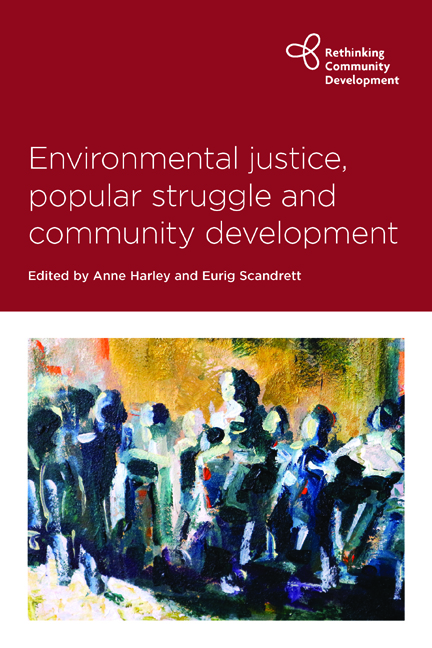Book contents
- Frontmatter
- Dedication
- Contents
- List of figures
- Series editors’ preface: Rethinking Community Development
- Preface
- Acknowledgements
- Notes on contributors
- Abbreviations
- One Community, development and popular struggles for environmental justice
- Two Resisting Shell in Ireland: making and remaking alliances between communities, movements and activists
- Three ‘No tenemos armas pero tenemos dignidad’: learning from the civic strike in Buenaventura, Colombia
- Four No pollution and no Roma in my backyard: class and race in framing local activism in Laborov, eastern Slovakia
- Five Tackling waste in Scotland: incineration, business and politics vs community activism
- Six An unfractured line: an academic tale of self-reflective social movement learning in the Nova Scotia anti-fracking movement
- Seven ‘Mines come to bring poverty’: extractive industry in the life of the people in KwaZulu-Natal, South Africa
- Eight Ecological justice for Palestine
- Nine Learning and teaching: reflections on an environmental justice school for activists in South Africa
- Ten The environment as a site of struggle against settler-colonisation in Palestine
- Eleven Communities resisting environmental injustice in India: philanthrocapitalism and incorporation of people’s movements
- Twelve Grassroots struggles to protect occupational and environmental health
- Conclusion
- Index
Five - Tackling waste in Scotland: incineration, business and politics vs community activism
Published online by Cambridge University Press: 27 April 2022
- Frontmatter
- Dedication
- Contents
- List of figures
- Series editors’ preface: Rethinking Community Development
- Preface
- Acknowledgements
- Notes on contributors
- Abbreviations
- One Community, development and popular struggles for environmental justice
- Two Resisting Shell in Ireland: making and remaking alliances between communities, movements and activists
- Three ‘No tenemos armas pero tenemos dignidad’: learning from the civic strike in Buenaventura, Colombia
- Four No pollution and no Roma in my backyard: class and race in framing local activism in Laborov, eastern Slovakia
- Five Tackling waste in Scotland: incineration, business and politics vs community activism
- Six An unfractured line: an academic tale of self-reflective social movement learning in the Nova Scotia anti-fracking movement
- Seven ‘Mines come to bring poverty’: extractive industry in the life of the people in KwaZulu-Natal, South Africa
- Eight Ecological justice for Palestine
- Nine Learning and teaching: reflections on an environmental justice school for activists in South Africa
- Ten The environment as a site of struggle against settler-colonisation in Palestine
- Eleven Communities resisting environmental injustice in India: philanthrocapitalism and incorporation of people’s movements
- Twelve Grassroots struggles to protect occupational and environmental health
- Conclusion
- Index
Summary
Introduction
Towards the end of the twentieth century, community composting and recycling of waste was thriving. Communities throughout Scotland were developing local services and social enterprises to reuse or recycle increasing amounts of domestic and industrial waste. These initiatives shared expertise through horizontal networks, which also started to campaign against the production of waste by industry. Minimising waste production, combined with community-controlled recycling, was the way forward.
Around the same time, waste industry businesses developed a new generation of waste disposal facilities: Energy From Waste (incinerators that recover the energy released from burning waste) and a number of policy initiatives were directing efforts away from community work and towards industry. The European Commission was planning to reconfigure the waste hierarchy to include Recovery (of energy) over Recycling within the Waste Framework Directive; the Publicly Available Specification (PAS)100 composting legislation was enforced on community composting initiatives; Renewable Order Scotland included burning waste as part of qualifying for renewable credits; and efforts were made to redefine ‘zero waste’ to include Energy From Waste at the Scottish Parliament level. This chapter analyses how these events started intensifying community struggles against the demise of community waste initiatives.
In their resistance to the environmental injustices of Energy From Waste, communities have used a range of tools, such as good neighbour agreements, international community links with other communities experiencing the same situations, public inquiries, creating a wave of Energy From Waste science knowledge and the emergence of a social economy within community waste initiatives in their defence against the waste industry's domination of waste. However, the waste industry also mobilised as a movement from above, with its own innovative ideas that led to the hijacking of the term ‘zero waste’. This is essentially a typical example of a repeated cycle of waves of community activism at loggerheads with big business and politics that leaves communities burned out and with a lack of trust for the system, which is rigged for communities to fail.
One of the guiding principles of the circular economy approach to industrial ecology is that one person's waste is another's resource. An underlying flaw in this is that a political economy overrides the industrial ecology. In a competitive market, waste becomes a resource only if the price is right and the waste cycle, from design, through production, use and disposal, is determined by a financial calculus.
- Type
- Chapter
- Information
- Publisher: Bristol University PressPrint publication year: 2019



